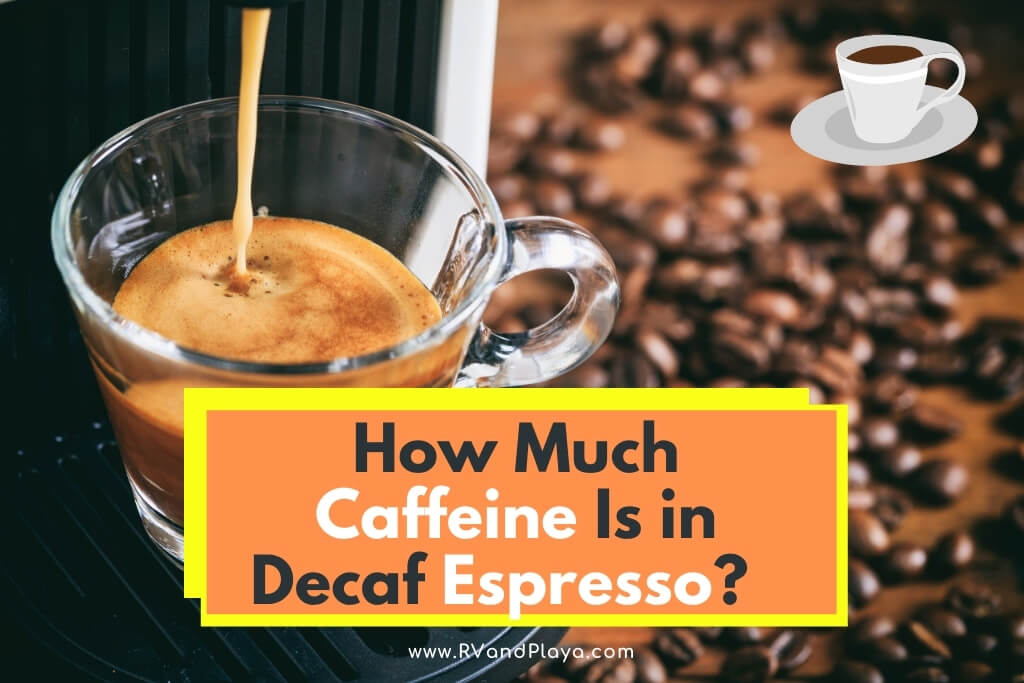Have you ever asked yourself how much caffeine is in decaf espresso? Well, you are at the perfect place to find the answer to such a question.
Decaf espresso (for example from Starbucks, Nespresso, Regular, or Lavazza) isn’t actually caffeine-free? It’s true. Decaf espresso and decaf regular coffee both have small amounts of caffeine in them. It’s important to know this if you’re drinking decaf because of a health issue or doctor advisement.
So, just how much caffeine is in decaf espresso? One popular study found there could be anywhere from 3 to 15.8 milligrams of caffeine in a decaf shot of espresso. A caffeinated shot of espresso usually has around 63 milligrams. The variance is due to the decaffeination process.
This article is all about the caffeine you take in when you drink decaf espresso and other coffee. We’ll look at the important distinction between decaf and caffeine-free.
We’ll also touch on any decaf espresso that doesn’t have caffeine if we find any. Read on to see what we’ve uncovered.
Table of Contents
The Truth About Decaf Espresso and Coffee
Decaf doesn’t really mean caffeine-free. It means the coffee beans have been through a process that takes the caffeine out of them. They’ve been decaffeinated.
Coffee producers have three methods for decaffeinating coffee. All three of them can start when the beans are green or roasted. All three of them begin with moistening the beans.
The coffee beans are moistened to convert the caffeine into a soluble state. That way, it can be dissolved and drawn out of the beans.
Green coffee beans are all brought to a temperature between 160º and 210º. It doesn’t matter which decaffeination process you’re using.
Read also: Who Makes Kirkland Decaf Coffee? (Real FACTS!)
Decaffeination Methods
The first method is called water processing. In this method, the solvent is water. Several vessels are used for a battery extraction method. This process is all-natural and removes about 94 to 96% of the caffeine.
The second method has a more direct solvent. Ethyl acetate is used to convert the caffeine into its soluble state for extraction. It’s a substance found in some vegetables and fruits. Some producers use coffee oil or methylene chloride, also.
This is a more direct approach because the solvents chosen are specific for use with caffeine. This method extracts around 96% of the caffeine.
In the third method, the direct solvent is carbon dioxide. It’s called supercritical carbon dioxide decaffeination. The carbon dioxide is circulated through the coffee beans at high pressure. This method is highly efficient and removes up to 98% of the caffeine.
Decaf Espresso Has Caffeine
Most decaf espresso has caffeine in it. It may be only trace amounts, but it’s usually present. The amount of caffeine varies even when shots of espresso are made from the same batch of coffee beans.
Some decaf espresso shots have been found to have almost 16 milligrams of caffeine in them. The average single espresso shot has about 63 milligrams in it.
That means that four shots of decaf espresso have about the same amount of caffeine in them as one regular shot of espresso.
Decaf vs. Caffeine-Free
Many people use these terms interchangeably. But their meanings are not the same.
Decaf refers to coffee made from beans that have gone through the decaffeination process. This term indicates that the product is made from something that was originally fully caffeinated.
If a product is labeled as caffeine-free it means there was never any caffeine at all. Caffeine-free means what it says, while decaf could mean there are still minute amounts of caffeine leftover.
Read also: Who Makes Kirkland K Cups (Medium Roast, Pacific Bold, Decaf)
Is There Decaf Espresso that Doesn’t Have Caffeine in It?
In one study done by The University of Florida, they found it extremely rare to find decaf coffee that didn’t contain any caffeine, regardless of the type of beans.
In fact, just one cup of decaf coffee was found to have no caffeine at all. It was in a shop that served decaf coffee made from Folgers Decaf Crystals.
Some studies have included decaf espresso from some of the biggest names in the coffee industry. All of the decaf espresso shots included had a small amount of caffeine in them.
The amount of caffeine in them isn’t consistent but it was always present.
Does Decaf Espresso Keep You Awake?
Generally, no, decaf espresso won’t keep you awake. However, that doesn’t mean that it can’t. Even small amounts of caffeine can lead to dependency.
It’s not likely you’ll get jittery or have a hard time getting to sleep, but it’s not impossible for that to be the case, either.
Read also: Who Makes Kirkland Breakfast Blend Coffee? (Latest FACTS!)
The Bottom Line
Decaf espresso (from Lavazza, Starbucks, Regular or, Nespresso) is not caffeine-free. Decaf and caffeine-free mean two completely different things. While the amount of caffeine in a shot of decaf espresso is minimal, it can still affect some people.
It’s even possible that your body can develop a dependency on the caffeine in decaf espresso.
If you have a reason to avoid caffeine altogether, it’s best to look for caffeine-free coffee products rather than decaf options.
Here are some of my favorite services, products, and Stores
There are affiliate links, so if you do decide to use any of them, I´ll earn a small commission. But in all honesty, these are the exact what I use and recommend to everyone, even my own family.
To see all my of most up-to-date recommendations, check out this resource that I made for you!
+ Products & Services
+ Convenience Stores
+ Save Thousands of Dollars
References
https://www.scientificamerican.com/
Recent Posts
Who Makes Kirkland K Cups (Medium Roast, Pacific Bold, Decaf)
K-Cups have revolutionized the way that we make coffee at home. With the ability to make a single serving of coffee in just a few minutes and choose from your favorite flavors, there is a lot to...
If you are a coffee lover, you probably track where you can get the best beans and grinds in town. It may surprise you, though, to find out that you could just buy your coffee at Costco. Kirkland...


